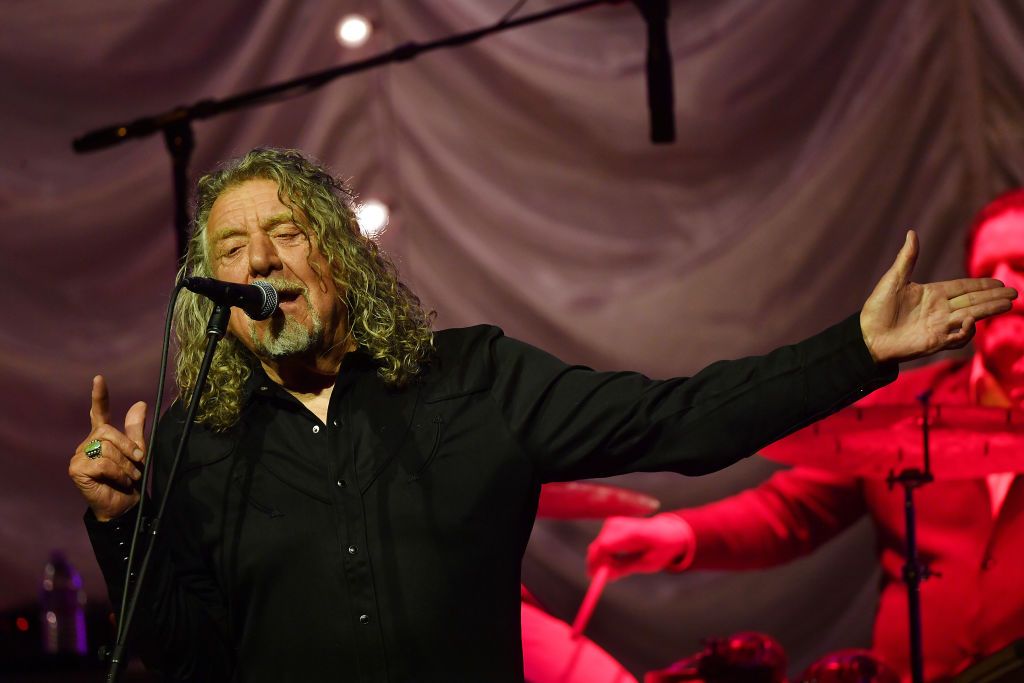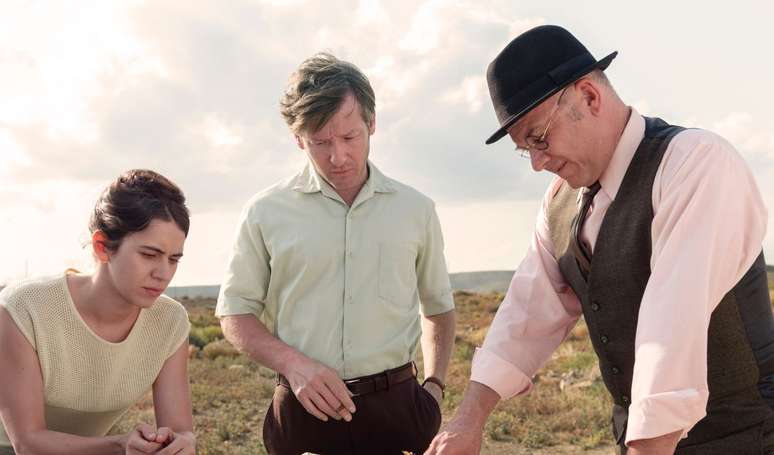Adam Granduciel, frontman of the band, unraveled the process of the album I Don’t Live Here Anymore before shows at C6 Fest
Adam Granducielband leader The War on Drugshad to give up control to finish the record I Don’t Live Here Anymore (2021). It is with him that the band arrives in Brazil for the first time to perform in São Paulo and Rio de Janeiro for the C6 Fest. In an interview with Rolling Stone Brazilthe musician reflected on the production of the album and the sounds of the eighties, which were mixed with the traditional folk of the North American group.
Track “I Don’t Wanna Wait” was used as an example by granducielwhich emulated the drum machine used by Phil Collins in songs like “In the Air Tonight”: “I had an application with a drum machine on my cell phone. It was configured in [Roland] CR-78, which Phil Collins used. I kind of didn’t choose it, it just happened. And then I immediately got to this place, this vibe.”
I made an album inspired by songs that I like. If you’re always recording and looking for something special, you’re going to end up with those details that remind you of the 1980s, or guitars of the 1990s.
Most of the project was ready when the covid-19 pandemic forced the musicians to stay at home. The period of isolation, however, gave the war on drugs “an extra year” to mature the album through unprecedented processes to granduciel. Accustomed to the almost excessive control of every detail of the tracks, the vocalist provided more freedom for the other musicians to follow their individual journeys while creating new ideas and recording some parts of I Don’t Live Here Anymore:
“It was fun and different, everyone could work in their own studio, at their own pace. Go to the studio, listen to the music, learn, put the kids to sleep, watch a movie, sleep, have coffee and go back to the studio. A week later they sent me the takes, which were better than anything they would have done if they had come to Los Angeles. Recording with the most expensive equipment is not the important thing. What matters is the relationship with the music and the ability to think about what they want to do. I learned to deal with control being taken away from me.”
Fatherhood also played an important role in the new way of working. The musician had his first child in 2019 and admitted that he had to deal with fatigue and other challenges: “I no longer work 12 hours a day in a studio during the week. working on it, I try to do the best I can, no matter how long it takes to make a record.”
Finally, granduciel commented on his own evolution as an artist since the release of
Lost In The Dream, responsible for raising the band to a new level of popularity. The pressure increased, but the artist considers that the album taught him the main way to improve as a composer: “What I learned was: ‘Whatever the reason you made that album, make another one for the same reason. Make the music you like. Some people will like it and some people won’t.’ [Lost In The Dream] gave me a sense of belonging to my own work and reminds me to make music for the right reason.”
Check out the full interview with Adam Granducielfrom the band The War on Drugs:
There are guitar and drum lines in I Don’t Live Here Anymore that make sense with your sound, but seem to be influenced by other ’80s genres beyond traditional folk and rock. Could you talk more about the record process? What was the sound you were looking for?
Adam Granduciel: In track four, for example, I had an application with a drum machine on my cell phone. I would sit at the piano, find a tempo I liked on the app and put the drum machine. It was configured in [Roland] CR-78, which Phil Collins used. I kind of didn’t choose it, it just happened. And then I immediately got to this place, this vibe. Then there’s the recording, the arrangements. Anthony [LaMarca], who was on drums, did an amazing turn, which is so simple. It’s not a fancy twist, it’s just simple and unique, impactful. All these things led us to a musical moment. The most important thing is to make music that you like. I made an album inspired by songs that I like. If you’re always recording and looking for something special, you’re going to end up with those details that remind you of the 1980s, or guitars of the 1990s.
Did the pandemic influence the recording of the album, especially considering the band’s organic sound – difficult to recreate from a distance?
Much of the record was written and recorded before the pandemic. Drums, bass, guitar. I started writing in 2018 and we worked a lot as a band from 2019 until the lockdown started. But the pandemic gave us an extra year. The songs were almost done, we didn’t need to start from scratch. The only track I did remotely was “Harmonia’s Dream,” but we’d been working on it for a year or two. We had the drum recording, but I had to start over. I hired my friend who was in Philadelphia to record. You know, just him and the sound engineer, all wearing two masks. Was cool. Normally I would have brought him to Los Angeles and been trying to take care of every detail. Since I wasn’t there, I just sent in the idea and asked for the takes I wanted. I knew what his turns were like… So he sent me the raw work and I said, ‘It’s perfect.’
This happened a few times during the lockdown. It was fun and different, everyone could work in their own studio, at their own pace. Go to the studio, listen to the music, learn, put the kids to sleep, watch a movie, sleep, have coffee and go back to the studio. A week later they sent me the takes, which were better than anything they would have done if they had come to Los Angeles. Recording with the most expensive equipment is not the important thing. What matters is the relationship with the music and the ability to think about what they want to do. I learned to deal with control being taken away from me.
That was just one of the questions. Did you feel like you were less in control of the album?
Yes, but I liked it! Everyone could process the songs. It was different, but I learned a lot. It made the record sound better.
Lost In The Dream, perhaps the album responsible for the band’s most drastic change in popularity, is completing nine years. What changed in your artistic perception in that period? Has increased popularity put more pressure on your work?
It put more pressure on me, but I didn’t feel like I was in school… It gave me more freedom to be the kind of songwriter I wanted to be. Whatever I did Lost In The Dream, was something that resonated with people without even trying. It was my third album and I wanted to do something better than the previous one, as a songwriter. It was one of those records where I wanted to do something for myself that I loved, but a lot of people connected. I didn’t get more confident, but I knew if I made the record I wanted to make… that was about it. The pressure you mention is like a person feeling like they have to do the same thing that made you popular, but what I learned was, ‘Whatever reason you made that record, make another one for the same reason. Make the music you like. Some people will like it and some people won’t.’ It was a gift to me for sure. But it gave me a sense of belonging to my own work and reminds me to make music for the right reason.
Sometimes I get frustrated. I have a child and I can’t work the same way as before. I get tired as fuck*, exhausted [risos]. I no longer work 12 hours a day in a studio during the week. But when a song comes along, I just feel grateful for it and I start working on it, I try to do the best I can, no matter how long it takes to make a record. We are grateful for what the last few years have brought us. I’m excited for what the next 10 years have in store for us.
Over the Lost In The Dream, I have a lot of recorded material from that time. I want to do something with it for the 10 year anniversary.
What do you expect from the shows in Brazil?
I hope three million people go crazy [risos]. We’re going to be playing songs from our entire back catalogue, we’re really excited. Since 2006, people who have played in South America have been saying to me, ‘You have to go. They will love it.’ It’s been 15 years trying to come and do some shows. We are confident that we will do the show and people will know how to sing the songs, they will be excited to see us play. We’re going to have fun and I hope it’s the first of many times.
It’s happening – we’re coming to Brazil!@c6fest
20 May
I live in Rio
Rio De Janeiro, BR#C6Fest
21 May
Ibirapuera Park
Sao Paolo, BRFor tickets & info, visit: https://t.co/9Du7UWOR2Rpic.twitter.com/ODCRtXQhGR
— The War on Drugs (@TheWarOnDrugs) March 1, 2023
Source: Rollingstone
Earl Johnson is a music writer at Gossipify, known for his in-depth analysis and unique perspective on the industry. A graduate of USC with a degree in Music, he brings years of experience and passion to his writing. He covers the latest releases and trends, always on the lookout for the next big thing in music.






